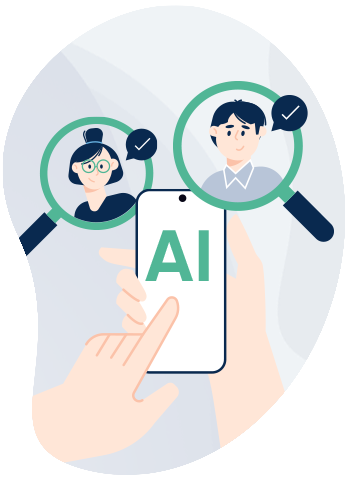As artificial intelligence increasingly enters our daily lives, we are beginning to wonder what potential dangers it may pose. Despite the many pluses, we must also realize the negative consequences such as the elimination of positions, loss of jobs, the compulsion to reorganize….
The main goal of AI is to automate processes, which means that the labor market will shrink and the need for specialists will decrease. Even professions that require a college degree and additional training are not immune to artificial intelligence, which is developing at a very fast pace. The HR industry will also feel the impact.
Can AI replace humans in recruitment?
For the Open AI study, experts and artificial intelligence separately elaborated on the potential threat to various professions. It turned out that the results of the study were significantly different. The GPT model, determined 86 positions that will undergo transformations resulting from the advent of artificial intelligence. According to the researchers involved in the study, 15 professions are vulnerable to the significant changes that artificial intelligence will bring. In both cases, the term “exposure” does not mean that the occupations will immediately disappear completely from the labor market.
Experts at McKinsey & Company in 2019 estimated that within 10 years artificial intelligence and automation could replace as many as 30% of jobs worldwide. There are claims that AI in the HR industry is growing so fast that it will replace 16% of recruiters by 2029.
Threats to the HR industry
Chatbots, which are often used on Facebook or on a company’s website, are currently growing in popularity. They interview the candidate, describing the position and answering questions. Based on the collected data, it matches the appropriate job offer to the candidate. Such solutions are capable of handling the most time-consuming and tedious stages of recruitment 24 hours a day, 7 days a week. As a result, some recruiters may become useless at this stage of the recruitment process.
Tools are also being developed that allow job ads to be automatically completed based on the submitted job description, regardless of its structure, and it only takes a few seconds. The model is based on descriptions of job advertisements available on the market. The recruiter’s task is only to provide a job description, and the tool will complete the content on its own. This creates a qualitative offer according to the information that potential employees are looking for. This is a huge time saver, up to tens of minutes per ad, and candidates receive a valuable ad in a proven and readable format.
We are slowly moving away from classic human interaction. It may turn out that what is currently a huge plus – a conversation between a recruiter and a candidate – will soon no longer be needed in the recruitment process, as artificial intelligence will select candidates based on keywords from a resume or cover letter, or even a video.
Automation of recruitment processes
A variety of algorithms allow much better matching of candidates based on their skills. Why? Because the recruiter during screening also pays attention to, among other things, the aesthetics of the appearance of the resume, and thus is not 100% objective. In this case, artificial intelligence eliminates such errors during selection.
Unfortunately, selection based solely on keyword matching can be a disadvantage. Algorithms check the keywords in candidates’ resumes and make selections based on this alone. It may happen that adequate candidates are rejected because they did not enter the right phrases in their resumes, made a typo or forgot key information relevant to the algorithm. The fact of the matter is that AI learns very quickly, so any mistakes will be quickly wiped out.
As far as candidates are concerned, this is information to carefully prepare your resume and check what keywords are key when applying for a position. Nowadays, matching your resume to a specific job offer and organization will become much more important so that you don’t get rejected at the candidate selection stage.
Do recruiters have anything to fear?
It is important to understand that the impact of AI on the HR industry is primarily aimed at positive aspects, such as streamlining processes, increasing efficiency, eliminating human error or providing more objective information. However, it is worth remembering to take precautions and manage appropriately to avoid potential risks and side effects, such as the leakage of sensitive data. Many steps in recruitment and monotonous tasks will be automated, where human labor will be replaced by artificial intelligence. However, can a person be completely eliminated from the recruitment process and find no place for himself in the HR industry?

